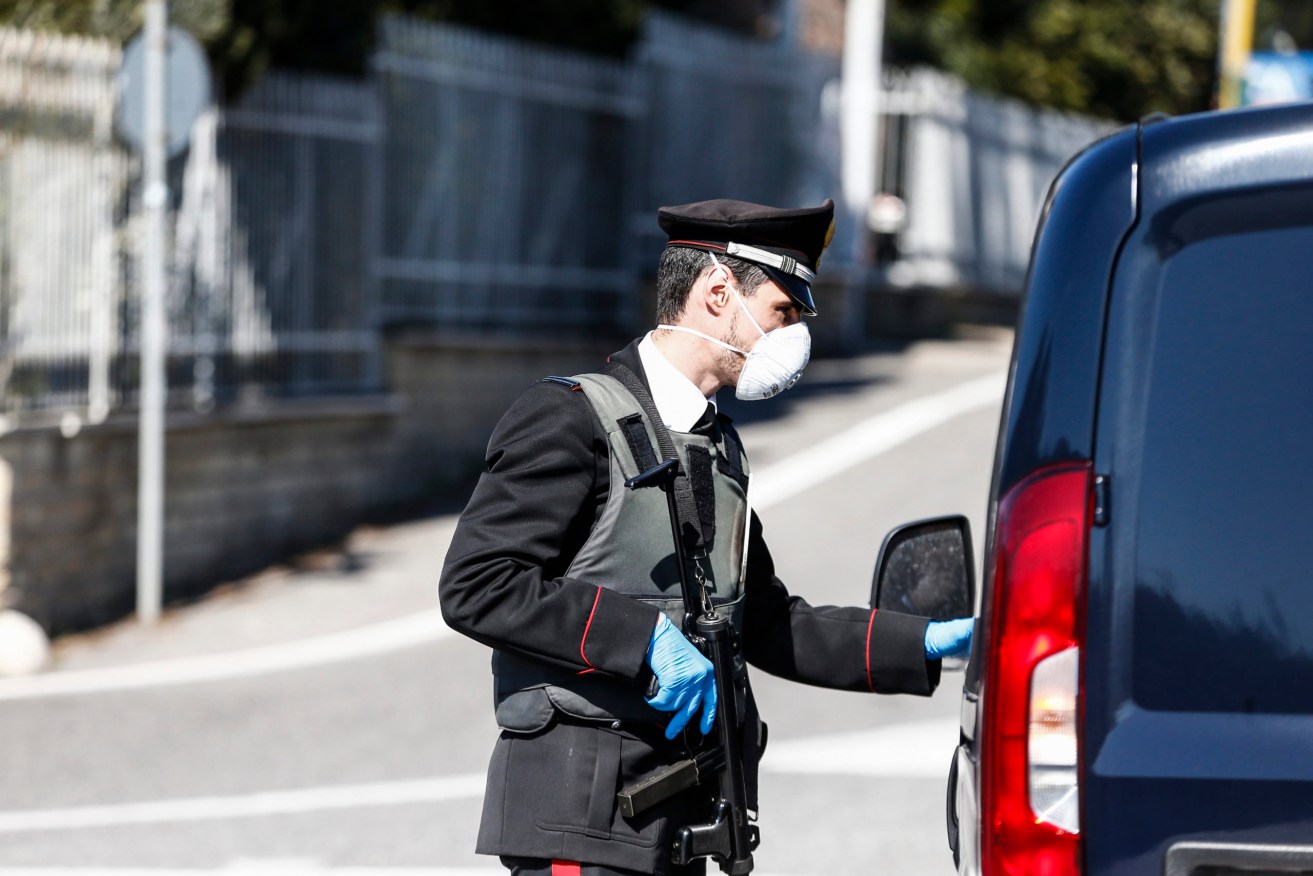Individuals must act responsibly in face of pandemic – or tough laws will act for them
Society expects people to behave responsibly when it comes to protecting themselves and others in the face of coronavirus. But governments have far-reaching laws and powers to call upon for the common good, writes Morry Bailes.

Photo: Cecilia Fabiano/LaPresse/Sipa USA
We rely, as a society, on people doing the right thing.
Laws and societal norms are what keep civilisation ticking over. Don’t steal, stick to traffic laws, mind your manners, be honest, honour your debts, and don’t engage in, of all things, undignified supermarket tugs-of-war over toilet paper.
The tragic thing about that particular spectacle is it makes clear that not everyone is going to play fair.
But in the light of coronavirus, there are some things more important than stocking up on toilet paper, and rules that must be observed.
Which is why when we are told to isolate to halt the spread of disease, we expect people to do so, and we are surprised – in many instances outraged – when members of a society defy the usual expectations and do not follow the rules, even if they are only moral rules or expectations.
But there is an abiding question that is raised when the subject of isolation is discussed in the context of government power.
Indeed, in this situation, a number of people have simply refused to do the right thing and obey the law.
From the Russian citizen who, when asked to self-isolate, ‘escaped’ citing reasons of personal freedom, to the Tasmanian chap who allegedly interpreted self-isolation to include attending work and university, it is plain we have a sprinkling of ‘numbnuts’ amongst our general population.
Yet haven’t we always? You know the type. They turn up to work flowing with rhinovirus, infecting others but heedless to others’ concern, because they are determined to ‘soldier on’, or unrepentant because they have become in their own minds irreplaceable, or too important to not be present.
Who can forget Miranda Priestly from The Devil wears Prada when she opined that her first assistant had become ‘an incubus of viral plague’.
Of course, scant regard is had by such to the fact that are usually able to work from home. Many come from a generation where sickness was weakness. They are what I would coin, “the spreaders”.
Enter the Biosecurity Act.
Parliament has thought about these circumstances already, although ordinarily in the context of plant or animal disease.
But it applies equally to human disease. It gives powers to the director of human biosecurity to use control orders to require people to do things.
Control orders are not unknown in the law. They are used, for instance, in controlling the conduct of known or convicted terrorists.
In the present context of coronavirus, what may be ordered of a person is the provision of health and other information, a restriction of specified behaviour and conduct, a direction to have medical treatment or procedures to reduce risk, or a direction to be isolated for a specified period of time.
Breaches of orders may be met with civil and criminal sanctions, and as always the long-suffering police get the ‘raw prawn’ in that they may be called upon to enforce orders.
The powers go beyond the individual however. Vested in the director is the power to declare ‘human health response zones’. In effect, it allows the declaration of quarantine areas, and allows orders to be made to prevent people from moving around.
Further, a human biosecurity emergency, once declared, provides even greater executive power to the Minister to stop human movement, and close or evacuate places.
All of these are federal powers. The Law Council has remarked that the powers may impact those without infection and that they are far reaching, which is true.
Desperate times, however, call for desperate measures, and it is doubtful that so long as powers are reasonably exercised we are likely to see much complaint. Wait, maybe those people who wanted to have a punch up over a roll of toilet paper might have an issue, but they are mercifully a tiny minority.
The State Parliament also toughened laws to give government additional powers, which given the federated country we live in can only be seen as wise.
The best we can hope for is prudent citizens that listen to and follow advice. What may be a cold for some means death for others.
It is a moment to take the proverbial deep breath, stop worrying about what you are going to wipe your backside with and work together, because if we do we’ll lessen the impact of this wretched situation and live to see another day.
Whilst getting the balance of executive power right is key, rest assured there will be little sympathy for those members of our society that imperil others, and governments have the power to control and restrain such people, and should use it when it is right to do so.
Creating ‘human health response zones’ will be harder to take and scary, but it is what it is.
However, society is not held together by law. It is held together by the respect for law and our fellow members of society.
No law can prevent a catastrophe if we do not work cooperatively together.
So wash your hands and carry on. There will be an end to this furore some day.
Morry Bailes is the managing partner at Tindall Gask Bentley Lawyers, immediate past president of the Law Council of Australia and a past president of the Law Society of South Australia.
Want to comment?
Send us an email, making it clear which story you’re commenting on and including your full name (required for publication) and phone number (only for verification purposes). Please put “Reader views” in the subject.
We’ll publish the best comments in a regular “Reader Views” post. Your comments can be brief, or we can accept up to 350 words, or thereabouts.




